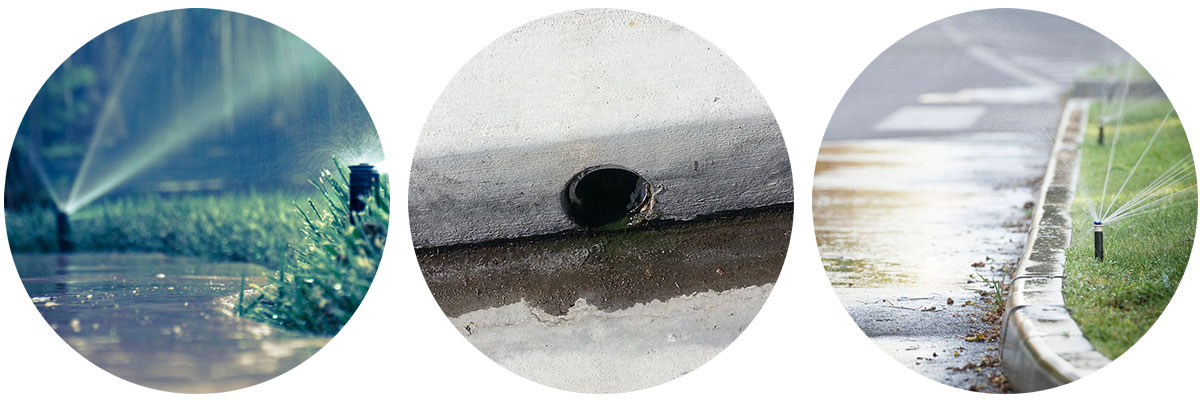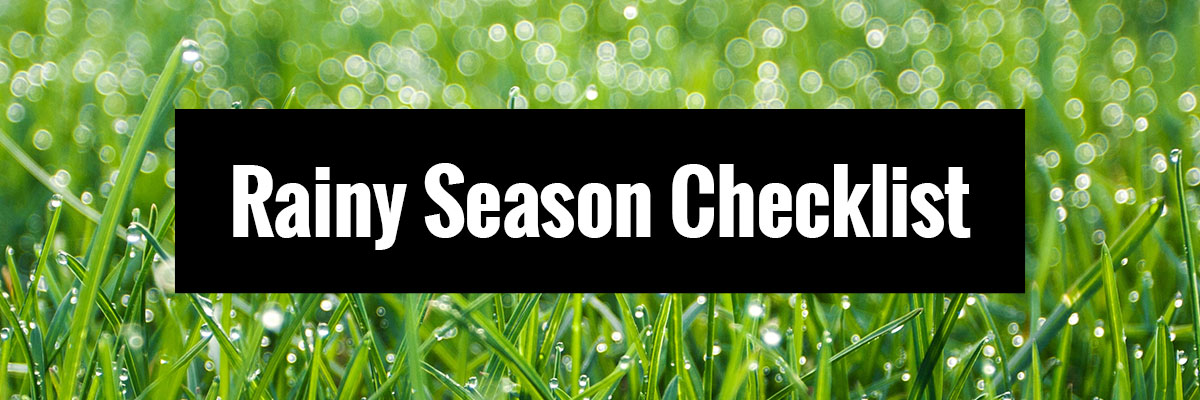OC Rainy Season Checklist: How to Keep Your Yard and Our Waterways Healthy
October 29, 2020

October marks the official start of the rainy season in OC! Now is a great time to take a few simple steps to prepare your home and yard for rainy weather.
Why should I prepare for rainy season?
Orange County receives an average of 14 inches of rain per year. Most of our rain occurs during the rainy season from October to May. During the rainy season, when temperatures are lower and days are shorter, your yard needs less irrigation to stay healthy than in dry summer months. In fact, too much water can be harmful to the health of your yard and our local waterways. Not only can excess water drown plant roots and promote lawn disease, if water from rain or irrigation runs off your yard into the street or gutter, it can carry chemicals and bacteria from pesticides, fertilizers, pet waste and other sources into our storm drains. Water in our storm drains is not treated or cleaned before entering our waterways. During the rainy season, it’s especially important to take steps to prevent runoff, as water leaving your yard can end up polluting our creeks, rivers, beaches, and ocean.
What is runoff?
Runoff is water from rain and outdoor water use that doesn’t soak into the ground. It can carry trash and other pollutants from your yard into our storm drain system. In addition to potentially causing algal blooms and bacterial growth in our waterways, pollutants in runoff can harm animal and human health and contribute to dirty beaches and beach closures. Runoff may appear as wet sidewalks, water in the street, or water flowing out of curb weepholes.

What is overwatering?
In the rainy season, your yard may only need 30% of the water required during dry summer months (according to the Watering Index). Overwatering through a combination of rain and irrigation can be harmful for your yard. In addition to causing runoff, overwatering can drown plant roots, making them more susceptible to pests and disease. If your yard is receiving too much water during the rainy season or any time during the year, you may notice the following:
- runoff during or after watering or excess standing water
- spongey ground or lawn
- moss, fungus or mushrooms
- excessive weeds or insects
- yellowish lawn or yellow leaves
- sour smelling soil
OC Rainy Season Checklist
Here are a few simple steps you can take to get ready for the rainy season:
- Pick up around your yard. Rain can carry trash, pet waste, yard debris or exposed household hazardous waste from your yard and other storage areas, such as the side of the house, into our storm drain system. To keep pollutants from entering our waterways, sweep up any trash or debris on hard surfaces like patios or driveways and place it in a covered trash bin. Rake up yard debris and place it in a covered trash or green waste bin. Store Household Hazardous Waste (HHW) indoors or under cover, in closed and labeled containers. You can dispose of HHW for free at any of Orange County’s four recycling centers.
- Repair leaking vehicles. Rain can wash oil and other fluids from leaky vehicles into our storm drains. Now is a great time to get your vehicle serviced to prevent leaking fluids from polluting our waterways. If vehicle maintenance isn’t an option at the moment, place drip pans under leaking vehicles to help protect our beaches and waterways. Recycle used oil by taking it to service stations and other recycling centers.
- Run your irrigation system and check for runoff. The start of the rainy season is a great time to make sure your irrigation system is doing its job by only giving your yard the water it needs to stay healthy. If you have a zone-based automated or manual irrigation system, try running each zone. Using a stopwatch or timer, monitor each zone for signs of runoff and note the time when runoff occurs. If you see runoff, try the following actions:
- For runoff caused by sprinklers…
- Align your sprinklers to only water vegetated areas. Your yard doesn’t benefit when sprinklers spray onto sidewalks or other areas that don’t need water. In addition to creating runoff, poorly aligned sprinklers can damage outdoor structures like fences. Adjusting any misaligned sprinklers and properly aiming sprinkler heads to water only vegetated areas can prevent runoff, reduce repairs, and keep your yard healthy.
- Repair sprinkler heads and leaks. Broken or leaky sprinklers can waste thousands of gallons of water per month and cause runoff. Immediately repairing sprinklers and fixing leaks prevents runoff from entering our waterways, reduce water bills, and helps keep our ocean clean.
- For runoff caused by sprinklers…
- Reduce runoff by adjusting your watering schedule…
- Cycle and soak – Shorter water cycles are good for your yard. Running multiple, shorter cycles with an hour or more break in between allows water to soak into soil and nourish your plants instead of running off as waste.
- Change the days – Watering too many days in a row may prevent your yard from absorbing water. Adding more time between your watering days can enable your yard to absorb the water it needs while preventing runoff. Be sure to check with your local water district, HOA, or city for guidance regarding watering days in your area.
- Water at sunrise – Watering early in the morning prevents water from being lost to wind or evaporation.
- Reduce runoff by adjusting your watering schedule…
Helpful tips: For more accurate results, run your system on a day not too soon after a recent watering. Since watering needs change throughout the year, check your system for runoff every three months to ensure your yard is getting the water it needs to stay healthy year-round.
- Consider hand watering outdoor plants. During the rainy season, when your yard needs less water, hand watering plants may be a good alternative to other watering systems. Garden hoses with automatic shutoff nozzles can use less water than sprinkler irrigation systems. An easy alternative to sprinklers, hand watering ensures only those areas that need water get it. Be sure to replace any leaking garden hoses and repair any leaky connections to help prevent runoff and keep our waterways clean.
- When hand watering or using a non-automated system, set a timer. Lawns quickly absorb the water they need to stay healthy. Setting a timer can help you remember to move or turn off your manual watering, to prevent overwatering and ensure your yard gets the amount of water it needs. Your local water district or city may have irrigation schedules to help determine the best water scheme for your yard.
- Skip watering before, during, and after rain. Watering too soon before or after a forecasted rain event (48 hours is a good benchmark) may affect your yard’s ability to absorb water and cause runoff. To prevent your yard from receiving too much water, monitor the weather forecast during the rainy season and adjust your watering accordingly.
- In addition, fertilizers and pesticides can be washed off your yard and into our storm drains during rain events. Apply fertilizers and pesticides only when it is not windy and never when rain is in the 48-hour forecast. Limit pesticide use by using nonchemical methods, integrated pest management, or least-toxic pesticides whenever possible.
Here are additional resources to help you prepare for the rainy season in OC:
- Looking for guidance on how much water your yard needs? In addition to running your system to check for runoff, you can find watering guidelines and customizable calculators from bewaterwise.com and the Municipal Water District of Orange County.
- Interested in updating your irrigation system? Rebates may be available for weather-based irrigation controllers, upgraded sprinkler nozzles, drip irrigation, and rain barrels to capture water and prevent runoff. Check your local water district for current rebate programs.
- Wondering how to monitor your yard’s watering needs? Moisture meters feature easy-to-read dials to indicate if soil is dry, moist, or wet. You can find moisture meters and soil moisture sensors at home improvement stores and irrigation supply stores. Rebates may also be available.
For more ways to prevent overwatering and runoff, check out our Landscape Improvement and Capture Water pages for additional modifications you can make to your landscape to protect our local waterways and ocean.
Did this article help you understand how to prepare for the rainy season? What else do you do to prepare? Have more questions about how to prevent runoff? Let us know in the comments.
